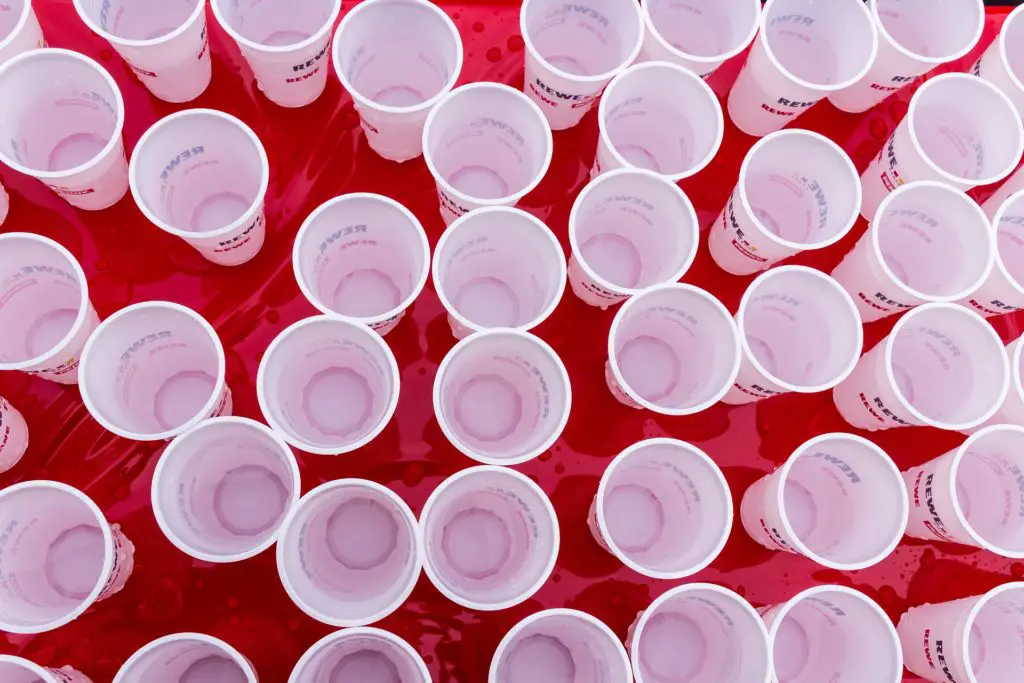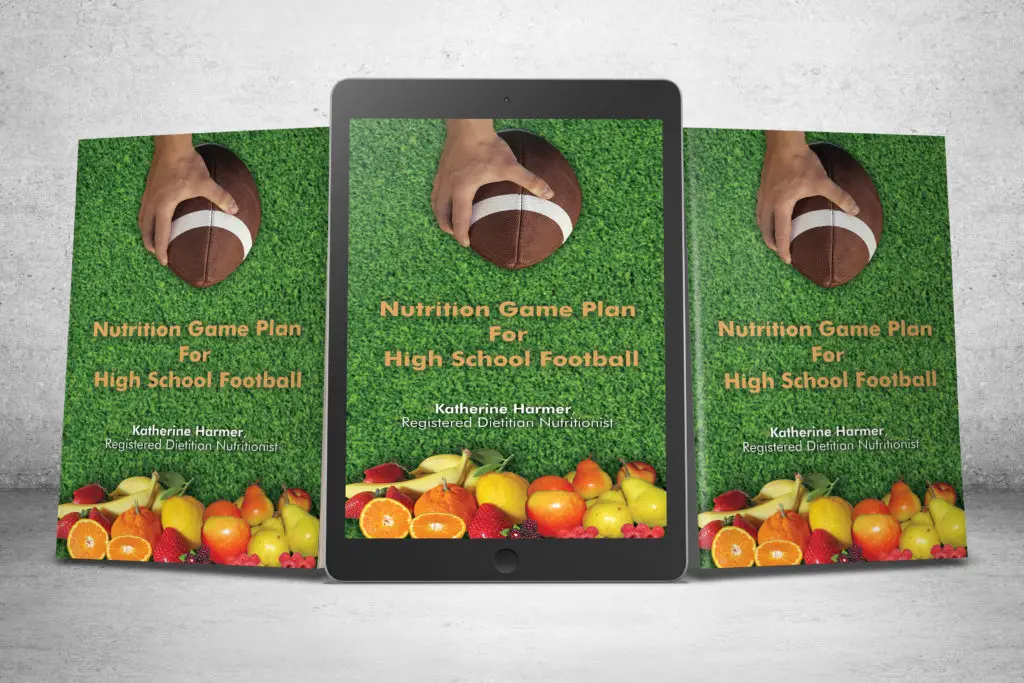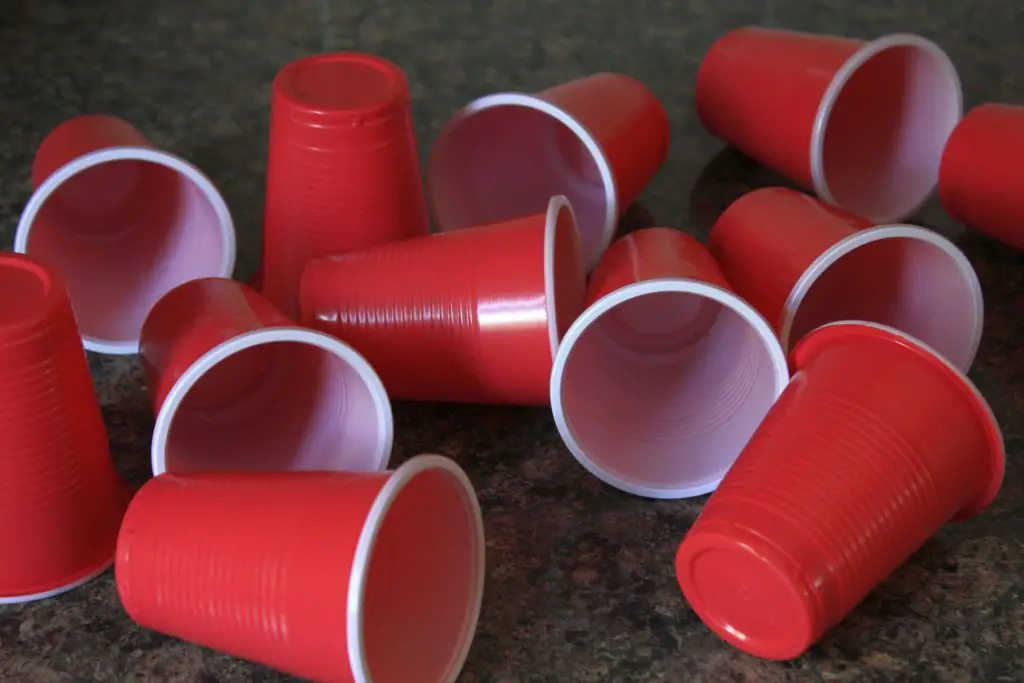You want to be like the top players and do the things they do and eat the things they eat? So what about alcohol?
Alcohol intake can lead to a risk of nutritional deficiencies, heart disease, cancer, liver disease, plus intoxication, alcoholism, and poor decisions.
Seems risky. But football players tend to be thrill-seekers and drinking tends to mimic the “high” response that adrenaline-addicted football players are after. Many football players choose to drink alcohol, often in very unsafe quantities. The NFL is unfortunately known for chronic misuse of alcohol, and even binge drinking problems among players.
Athletes should be very careful about alcohol intake because they may jeopardize their athletic performance and overall health.
Keep reading for more tips and information about alcohol intake, hydration, sports drinks, and football.

Looking for a little more help and guidance with nutrition this season? I’ve got you covered-
Fuelint Teens Nutrition Game Plan for High School Football Ebook

All you need to know for a healthy football season! Including a 28-day meal plan, snack idea list, hydration recommendations, tips for what, when, and how much to eat for football, plus more. Fuel up for your best football season yet and rise above the competition!
Click here for more information.
Do Professional Football Players Drink Alcohol?
Tom Brady– arguably the best quarterback of all time- does not drink alcohol. If you want to be the next Tom Brady, you might think twice about drinking. His health is important to him as evidenced by his dietary practices. He takes care of himself inside and out and doesn’t want alcohol to affect his playing ability on the field.
There are some professional football players that do NOT drink alcohol. Some have chosen so for health reasons, religious reasons, and others because alcoholism has been an issue for them in the past (DUIs, rehab) and they have decided to come clean and stay sober.
There are many other top sports stars who abstain from drinking alcohol. Cristiano Ronaldo, the top soccer player, does not drink alcohol due to family history (his father passed away from alcoholism).
As an elite athlete, professional football players should take their job very seriously and treat their bodies carefully and abstain from alcohol. In the very least they should be very smart about their alcohol intake and drink very little.
Some players hit the bars every Friday and party for most of the weekend and turn into alcoholics and have rough lives because of it. Others choose to drink occasionally in moderation and sometimes not at all.
Teams often have rules regarding alcohol intake, curfews for partying, etc. What does your team teach you? Follow the limits that your coaches give you, it’s for your own health and safety and helps you play at your best ability.
Why Alcohol is Bad For High School Athletes
Here’s a list of some of the reasons and health risks for why football players, especially high school football players, should not drink alcohol:
- #1 reason- you’re underage and you should not consume alcohol illegally.
- Increased blood pressure – Alcohol constricts blood vessels which means less blood flow is going to muscles. That means less energy and less oxygen is being delivered to your muscles. This is especially bad if you consumed alcohol before football.
- Elevated triglycerides – Triglycerides are a type of fat in your blood that is stored in fat cells. You don’t want this level to be too high as it could lead to worse health problems.
- Liver damage – Alcohol-related liver disease is preventable by not drinking. It causes inflammation, fat build-up, scarring, and reduced liver function.
- Increased risk of cancer – Alcohol use increases your risk of a lot of diseases, including certain cancers.
- Extra calories and weight gain– Alcohol provides extra calories which could lead to weight gain and other health conditions
- Poor performance– Your athletic performance will be negatively impacted. Your endurance, speed, agility, balance, and coordination will be reduced and your body’s ability to recover and build stronger muscles will decrease.
- Diuretic effects– Alcohol can be a diuretic, so drinking too much makes you dehydrated and makes you pee more.
- Compromises the immune system– Alcohol decreases your immune system response, which you need to stay healthy and to recover after a game.
- Ruins lives– In large amounts, alcohol ruins performance, health, careers, relationships, and lives.
The effect of alcohol depends on many factors, including the timing of alcohol consumption, recovery time, injury status, and dose being consumed. Athletes should abstain from alcohol to avoid the negative impact on recovery and athletic performance.
I chose to list the more severe risks of regularly drinking because athletes tend to over-indulge alcohol often and can become alcoholics. Athletes tend to consume greater amounts of alcohol through bingeing behavior compared with the general population, and put themselves at greater risk of alcohol-related problems.

Effects of Drinking Alcohol Before a Football Game
Timing of alcohol intake matters. It is not a good idea to drink alcohol before you are physically active. Do not drink alcohol the day of a football game. Even if you drink the night before a big football game, your performance will be negatively impacted.
During a football game you need your body to be healthy and perform at your top ability. If you recently consumed alcohol it causes difficulties for you to be at your best.
Your performance will suffer because your body will have a hard time processing stored fuel for your muscles, your playing capabilities and focus will be off, and you will increase your risk for injury. Here’s more details about these negative side effects:
1. Your Body Cannot Effectively Process Stored Fuel For Your Muscles
Your body has a hard time processing alcohol and turning it into energy. Your liver has to focus on processing alcohol, which means it will be less efficient at producing glucose for energy during a game.
2. Playing Capabilities Will Be Negatively Affected
There is a common belief that alcohol aids performance- this is not likely, there is a decrease in your endurance even if small amounts of alcohol are consumed before a game.
Alcohol impairs strength, power, muscular endurance, reaction time, memory, concentration, and dexterity during playing. With decreased coordination and delayed reactions you certainly won’t be playing at your best.
3. Increases Your Risk for Injury
With compromised motor skills, impaired balance, and poor judgment, your performance is highly affected and your risk for injury is increased. If you are injured, alcohol will negatively impact your body’s healing process as well. Alcohol decreases your immune function, resulting in prolonged healing time.
Effects of Drinking Alcohol After a Football Game
Alcohol negatively affects playing capabilities, so most athletes do not drink before a football game. Drinking in celebration or defeat after a game is much more common and a likely time for athletes to drink, but still has negatively effects on you and your body.
Drinking alcohol is seen as a reward for the hard work put in during the game or for relaxation, so the majority of problematic alcohol use occurs in the hours after a game. Alcohol consumption after a game won’t affect performance, but it interferes with the recovery process.
Here’s some common problems of consuming alcohol after a football game:
1. Nutritional Deficiencies
After a game is a common time for athletes to consume alcohol, however this is the crucial time for correct nutritional strategies to recover, refuel, and rehydrate. You need to refuel with carbohydrates, protein, electrolytes, and plenty of water. You should never re-hydrate with alcohol. Alcohol does not contain enough carbs or electrolytes for proper recovery.
Alcohol also inhibits your body’s absorption of nutrients from food, which can lead to nutritional deficiencies with serious health and performance implications. Follow nutrition guidelines in the hours after a game, your body needs it.
2. Less Protein Synthesis
After physical activity your body repairs and rebuilds muscle tissue to make it stronger and bigger. With alcohol in your blood, there is less protein synthesis so recovery is negatively impacted. Alcohol reduces your production of testosterone and inhibits recovery and muscle adaptation to exercise. Your muscles won’t be built bigger and your endurance won’t increase as much with alcohol.
3. Poor Sleep
Athletes need adequate sleep! Alcohol intake negatively affects your sleep, especially if you have a hangover. It disrupts your sleep cycles and quality of sleep. Sleep is so important after a sporting event- it is needed to help your body recover and decrease your risk of injuries. You need more sleep after a football game than normal. Getting enough rest is essential for proper recovery to build and grow your muscle tissue.
4. Bingeing
It is common among athletes to celebrate or reward themselves after a game by binge drinking and consuming large amounts of alcoholic beverages. Bingeing behavior is harmful and associated with long-term physical, psychological and social problems.
Alcohol Recommendations for High School Football Players
There is no safe amount of alcohol for teenage athletes. Only adults of LEGAL age may consume alcohol, and then only 1-2 drinks are recommended. Alcohol hinders athletic performance and recovery and intake should be avoided for athletes hoping to be at their top performance capabilities.
Alcohol is a drug and a poison and should be treated like one and avoided. Consuming even low doses of alcohol before or after athletic performance is discouraged due to the negative effects of alcohol on performance and recovery.
If you are of legal age and choose to drink alcohol, always be smart and responsible about your choices. Start with a nonalcoholic drink first- preferably water- especially if you are thirsty.
Drink your alcoholic beverages slowly and don’t drink on an empty stomach. Choose to drink 1-3 glasses of water between alcoholic beverages and don’t over-do it. If you don’t drink alcohol, starting is never recommended.
Summary
- Drinking alcohol negatively affects athletic performance and recovery.
- Alcohol intake is not recommended for athletes, especially for teenagers. Drinking too much alcohol can affect you for days after and cause poor decisions and bad habits.
- Anyone can become an alcoholic, those who are safe from the effects are those who abstain from alcohol.
- Enjoyed these tips? Want more nutrition information for your football season? Be sure to check out my ebook- Nutrition Game Plan for High School Football. All you need to know for high school football nutrition in one place!
Check out some of my related posts:
Free Meal Plan for High School Football Players
Should Football Players Drink Gatorade?
The Worst Foods to Eat Before Football
How Big Should Football Players Be?
How Many Calories Does a High School Football Player Need?
References:
1. Academy of Nutrition and Dietetics. Eat Right and Drink Responsibly.
2. American College of Sports Medicine Health and Fitness Journal. Alcohol and Athletic Performance. Volpe, Stella Lucia Ph.D., R.D., L.D.N., FACSM. May/June 2019. Volume 14(3):28-30.
Fueling Teens is a participant in the Amazon Services LLC Associates Program, an affiliate advertising program designed to provide a means for sites to earn advertising fees by advertising and linking to Amazon.com. We also participate in other affiliate programs which compensate us for referring traffic.
